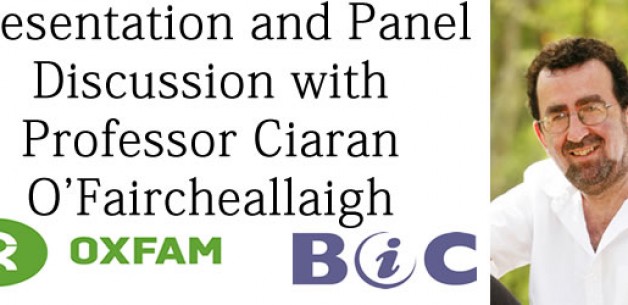Community Controlled Impact Assessment and Impact and Benefit Agreements:
Relevance for upward harmonization of World Bank Group Safeguard Policies
Presentation and Panel Discussion with Ciaran O’Faircheallaigh
Professor of Politics and Public Policy in the School of Government and International Relations,
Griffiths University, Australia
Panel Moderator: Vince McElhinny, Sr. Policy Advisor, Bank Information Center
Respondents: Meg Taylor, Vice President and Compliance Advisor Ombudsman at the IFC
Emily Greenspan, Sr. Policy Advisor , Oxfam America
Thursday, November 21, 2013
10:00-11:30 am
Light Lunch will be provided
Location: Oxfam America
1100 15th St NW, Suite 600
Washington, DC 20005
See the full public presentation here.
Dr. Ciaran O’Faircheallaigh will present experiences with two mechanisms that are increasingly used by Indigenous communities and organisations in Australia, Canada and other countries to enhance the benefits they receive from large-scale industrial development, particularly in the resources sector. The first mechanism involves the conduct of community-controlled social, economic and cultural impact assessments of proposed developments; the second the negotiation of contractually-binding agreements between affected communities, private developers and state authorities. The presentation and panel discussion will consider how these mechanisms might be applied to enhance the effectiveness of World Bank policies that affect Indigenous peoples, particularly OP 4.01 – Environment Assessment, OP 4.10 – Indigenous Peoples, and OP 4.12 – Involuntary Resettlement.
Professor Ciaran O’Faircheallaigh is a leading international authority on the relationship between Indigenous peoples and large-scale resource development. Based on 30 years of research, he has published nearly a hundred books and articles on Indigenous – resource company agreements, social and cultural impact assessment, resources policy and mineral economics. He was elected a Fellow of the Society for Applied Anthropology and of the Academy of the Social Sciences in Australia in recognition of his work in these areas. He is a co-author of the chapter on culture and Indigenous communities for the 2011 edition of the SME Mining Engineering Handbook, and as author of the chapter on Indigenous social impact assessment in the 2011 New Directions in Social Impact Assessment. For over 20 years he has worked with Indigenous organizations in Australia, Canada and Papua New Guinea on social impact assessments and on negotiation of impact and benefit agreements with mining and oil and gas companies, and has acted as adviser or negotiator for many of Australia’s leading Aboriginal organizations, including the Cape York, Northern, Yamatji, and Kimberley Land Councils. In 2007 – 2008 he developed, with Professor Marcia Langton, the Good Practice Standards used by Rio Tinto Iron Ore and Pilbara native title groups in developing comprehensive native title agreements for Rio’s iron ore operations in the Pilbara region. He recently coordinated on behalf of the Kimberley Land Council a 6-volume Indigenous Impacts Report on a proposed Liquefied Natural Gas (LNG) Precinct north of Broome in Western Australia, and is currently advising the Autonomous Bougainville Government on the possible reopening of the Bougainville copper mine in Papua New Guinea.
For more information, see www.bicusa.org/safeguards or please contact Vince McElhinny, vmcelhinny@bicusa.org.
Briefing paper on community controlled impact assessment, impact and benefit agreements and World Bank policies on indigenous peoples, Professor Ciaran O’Faircheallaigh, November 11, 2013
